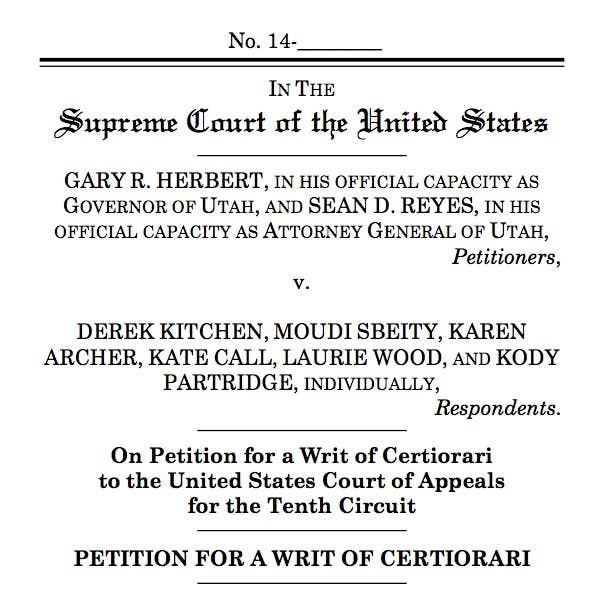
Utah officials on Tuesday asked the Supreme Court to hear an appeal of the case challenging the state's ban on same-sex couples' marriages — the state's last chance to uphold its ban and a case with nationwide implications.
After losing at the trial court in December 2013 and in the 10th Circuit Court of Appeals in June, the request to the Supreme Court is the only option remaining for Gov. Gary Herbert and Attorney General Sean Reyes, who are defending the ban.
If the court hears the case, the justices could issue a definitive, nationwide ruling on whether the many state same-sex marriage bans being challenged across the country are constitutional or not.
The Supreme Court, however, need not take the case. The process of seeking a writ of certiorari filed on Tuesday is the way of asking the court, which mostly gets to pick and choose which cases it wants to hear, to hear their case.
In the filing, Herbert and Reyes — represented by John J. Bursch, the former Michigan Solicitor General who has become a go-to conservative Supreme Court litigator since leaving that role; Gene Schaerr, a DC lawyer who left his role as a partner at Winston & Strawn to represent the state in the case; and state attorneys — gave the court eight reasons to take its case. Notably, although Schaerr argued the case at the 10th Circuit, Bursch is listed as the counsel of record in Tuesday's filing.
The request comes despite the fact that one of the main reasons the court takes a case — a so-called "circuit split" that happens when different courts of appeals reach conflicting decisions on a matter — does not exist among the courts to have decided marriage cases since the Supreme Court's decision striking down part of the Defense of Marriage Act in June 2013.
Nonetheless, Utah argues that the Supreme Court should hear its appeal because: (1) the court is "familiar" with the case because of the stay proceedings that were considered by the court, (2) state officials are "united" in defending the ban, (3) lower courts ruled that the state's laws "were not based on animus," (4) the "fundamental rights" questions are clearly presented, (5) the case involves both marriage and marriage recognition claims, (6) there are no standing issues at play in the case, (7) there is "no need to let the issue percolate even more," and (8) the harm in waiting to resolve the issue is significant, "regardless of which side prevails."
The plaintiffs in the case will now respond to the "cert petition," as will outside parties who wish to share their view with the court.
Clerks in Oklahoma and Virginia already have said that they, too, will be asking the court to hear appeals that they lost in the 10th Circuit and 4th Circuit, respectively.
The Supreme Court is not expected to take any action on the petitions before they return to begin their new term in late September. At the same time, however, they are not require to act then. In 2012, for example, the justices did not act on requests relating to DOMA or California's Proposition 8 marriage amendment until December of that year.
Here's how the petition ends:

